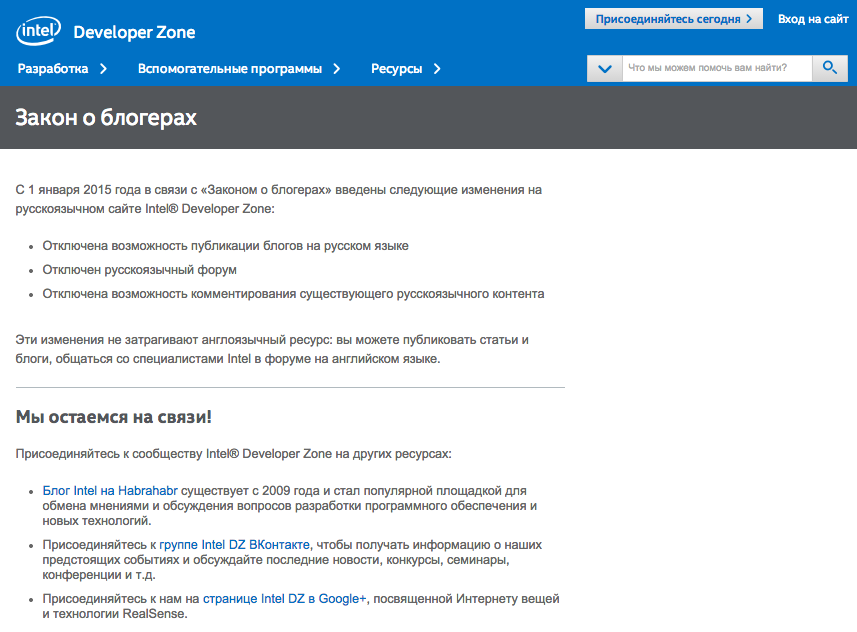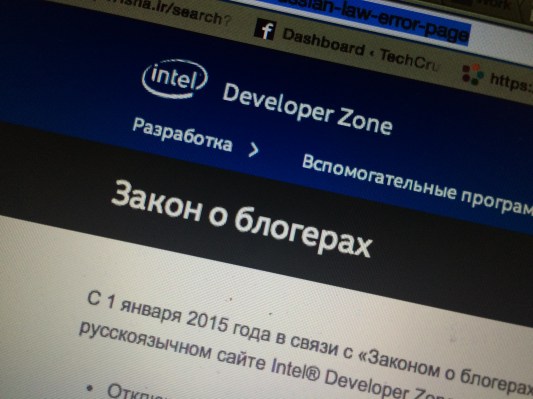Add Intel to the growing list of U.S. tech companies that are changing up some of their policies and business in Russia as a result of the government’s tightening reign on Internet use. Citing Russia’s new “Blogger Law” that was first introduced last year, Intel has shut down all of its popular Russian-language developer forums. The company tells us that it is now redirecting users to post on Intel pages hosted on third-party sites, or to Intel’s own developer forums that continue to be run in English, and hosted outside of Russia.
A little backstory: Russia’s blogger law effectively stipulates that sites with more than 3,000 daily readers are subject to tighter controls and monitoring by the Russian Internet regulator, Roskomnadzor. Among the requirements for authors on these sites: mandatory registration with Roskomnadzor and being subject to the same rules as professional journalists, which are registered with the state.
Those who violate the law are subject to fines of 10,000 – 30,000 rubles (US$285-$855) or as much as 500,000 rubles ($14,285) for professional organisations hosting the content.
A source in Russia tells us that Intel’s developer blogs are some of the most popular of their kind in Russia. “Struggling to think of any corporate dev blogs with similar outreach,” he says.
Intel notes on its pages that it has disabled the ability to publish blogs in Russian, its Russian-language forum and also all comments in Russian. It also notes that those who would like to keep publishing can either do so in English. (A screen shot of the page in Russian is at the end of this post.)
We reached out to Intel, which provided us with further elboration about what is exactly being affected:
“Because of new laws in Russia and in order to comply with these laws, we are redirecting developer blogging in Russia from our Intel Developer Zone to Habrhabr, a 3rd party Russian tech community website. Intel remains very committed to our Russian developers and customers, and the majority of content on our Russian language Intel Developer Zone site remains unchanged.
“Other Intel platforms that support Russian language also remain unchanged including: Intel’s blog at Habrahabr.ru, IntelDeveloper Zone groups at Vkontakte.ru and Google+, and official Intel Russia accounts at Facebook, Instagram, Vkontakte, YouTube and Twitter. Also, our Intel-owned, Russian language online communities for educators and IT-professionals – Intel Education Galaxy and Intel IT Galaxy are operating as usual.”
The bigger picture here is that the Russian government continues to tighten its reign on media and also how ordinary citizens express themselves in public forums, and specifically online. Companies like Facebook and Google have also been dancing around the authorities with regards to how their sites fall subject to the rules.
In December, Facebook appeared to block a page that was set up in opposition to Putin. However, just days later the social network, along with Twitter and Google, was named in a story detailing how U.S. companies were resisting orders from the government to remove content. It seems to be a moving target, and U.S. giants don’t quite know where they stand.
Intel may be more likely to host posts on software bugs than calls for anti-government rallies, but to play nice, it looks like is taking a cautionary position here. Developer sites may never be as mainstream as social networks like Facebook or homegrown-equivalent Vkontakte (which has had its own run-ins with the Russian government, especially when founder Pavel Durov was still in charge).
But as a recent Russian block of Github showed, even developer-focused sites can be highly galvanizing in a country strong on engineers where science and technology sit in close quarters with artistic pursuits. In the case of Github, the site was blocked over a piece of code that was actually a list of ways to kill oneself, written more as a political parody but still violating state policies on the publishing of suicide-related content.

